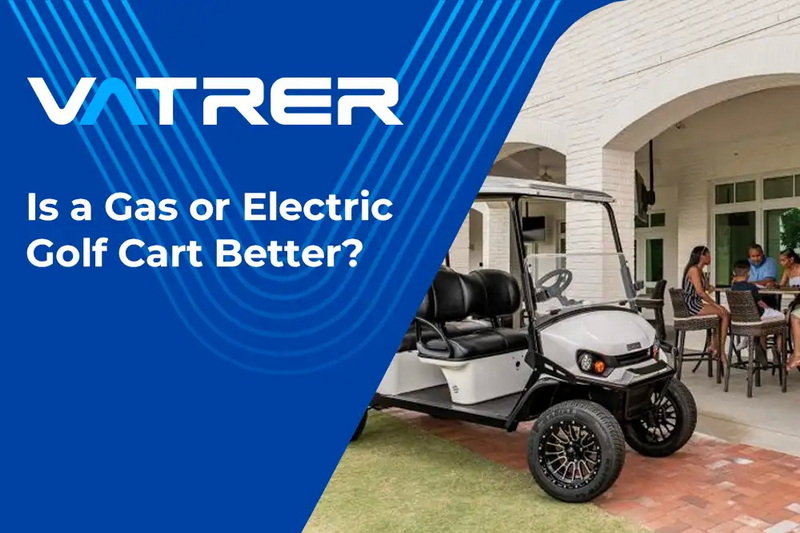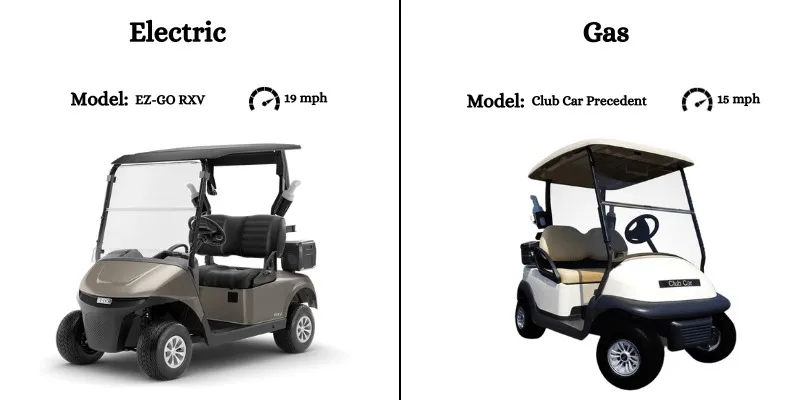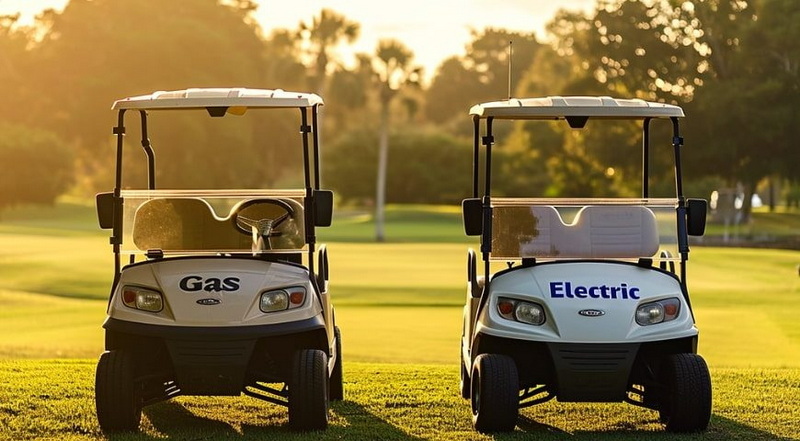Content Menu
● Overview of Gas and Electric Golf Carts
● Performance Comparison
● Maintenance Considerations
>> Gas Golf Carts:
>> Electric Golf Carts:
● Cost Analysis
>> Gas Golf Carts:
>> Electric Golf Carts:
● Environmental Impact
>> Gas Golf Carts:
>> Electric Golf Carts:
● User Preferences
>> Choose Gas Golf Carts If:
>> Choose Electric Golf Carts If:
● Detailed Pros and Cons
>> Gas Golf Carts: Pros
>> Gas Golf Carts: Cons
>> Electric Golf Carts: Pros
>> Electric Golf Carts: Cons
● Usage Scenarios
● Future Trends in Golf Carts
● Conclusion
● FAQ
>> 1. What is the average lifespan of a golf cart battery?
>> 2. Can electric golf carts be used in hilly areas?
>> 3. How long does it take to charge an electric golf cart?
>> 4. Are gas golf carts more powerful than electric ones?
>> 5. Which type of golf cart is better for the environment?
Golf carts have become an essential part of the golfing experience and are increasingly used for various recreational and utility purposes. As you consider purchasing a golf cart, one of the most important decisions you'll face is whether to choose a gas or electric model. Each type has its unique advantages and disadvantages, which can significantly impact your overall experience. This article provides a comprehensive comparison of gas and electric golf carts, exploring aspects such as performance, maintenance, cost, environmental impact, and user preferences.

Overview of Gas and Electric Golf Carts
Gas golf carts operate using a gasoline engine, similar to traditional vehicles. They are typically powered by a four-cycle engine that runs on regular unleaded gasoline.
Electric golf carts, on the other hand, rely on rechargeable batteries to power electric motors. Modern electric carts often use 48-volt systems that provide substantial torque and performance.
Performance Comparison
When it comes to performance, gas and electric golf carts exhibit distinct characteristics:
| Aspect | Gas Golf Carts | Electric Golf Carts |
| Power | Higher horsepower; ideal for hilly terrains and heavy loads | Instant torque; quick acceleration |
| Runtime | Can travel 100-200 miles on a full tank | Typically 30-50 miles on a full charge |
| Speed | Generally higher top speeds | Lower top speeds but rapid acceleration |
| Refueling/Charging | Quick refueling at gas stations | Longer charging times (8-14 hours) |
Gas-powered carts are known for their ability to tackle steep hills and maintain higher speeds over longer distances. They can be more suitable for users who require extended range and power for hauling loads or navigating rough terrain. Electric carts excel in providing instant torque, making them responsive and easy to handle.
Maintenance Considerations
Maintenance is another critical factor when choosing between gas and electric golf carts:
Gas Golf Carts:
- Require regular oil changes, spark plug replacements, and other mechanical upkeep.
- More complex mechanical systems lead to potentially higher maintenance costs over time.
Electric Golf Carts:
- Generally require less maintenance due to fewer moving parts.
- Battery replacement is the primary maintenance concern, with lead-acid batteries lasting around 2-5 years and lithium-ion batteries lasting up to 20 years.
Overall, electric carts are typically easier and cheaper to maintain than their gas counterparts.

Cost Analysis
The initial purchase price can vary significantly between gas and electric golf carts:
Gas Golf Carts:
- Often have a lower initial cost.
- Fuel costs can add up over time, impacting long-term expenses.
Electric Golf Carts:
- Higher upfront costs due to battery technology.
- Lower operational costs since electricity is generally cheaper than gasoline.
While gas carts may seem more affordable initially, the total cost of ownership often favors electric models due to their lower maintenance and operational costs.
Environmental Impact
Environmental considerations are becoming increasingly important in today's world:
Gas Golf Carts:
- Produce emissions that contribute to air pollution.
- Environmental impact is a significant downside for many users concerned about sustainability.
Electric Golf Carts:
- Produce zero emissions during operation.
- Considered more eco-friendly options that align with modern environmental standards.
Choosing an electric golf cart can be a more responsible choice for those looking to minimize their carbon footprint.
User Preferences
Ultimately, the choice between gas and electric golf carts often comes down to personal preferences:
Choose Gas Golf Carts If:
- You need a cart for heavy-duty tasks or hilly terrains.
- You prefer quick refueling capabilities without worrying about charging times.
Choose Electric Golf Carts If:
- You value quieter operation and lower emissions.
- You want reduced maintenance needs and lower operating costs.

Detailed Pros and Cons
To further assist in your decision-making process, here's an in-depth look at the pros and cons of both types of golf carts:
Gas Golf Carts: Pros
- Powerful Engine: Gas-powered golf carts have powerful engines that can tackle steep hills easily.
- Lower Initial Cost: Generally more affordable upfront compared to electric models.
- Quick Refueling: Refueling is fast at gas stations compared to the lengthy charging times of electric carts.
- Longer Range: Can cover greater distances without needing to stop for fuel.
Gas Golf Carts: Cons
- Environmental Impact: Emit pollutants contributing to air quality issues.
- Higher Operating Costs: Ongoing fuel costs can accumulate over time.
- Noise Pollution: Typically noisier than electric models, which may disturb the peace on the golf course.
Electric Golf Carts: Pros
- Eco-Friendly: Produce no emissions during operation, making them environmentally friendly.
- Lower Maintenance Costs: Fewer moving parts mean less frequent repairs; however, battery replacements can be costly.
- Quieter Operation: Operate silently, providing a more serene golfing experience.
Electric Golf Carts: Cons
- Limited Range: Typically have a shorter range per charge compared to gas models.
- Longer Charging Times: Charging can take several hours, which may not be convenient for all users.
Usage Scenarios
The intended use of your golf cart can also influence your decision:
- For recreational golfers who primarily use their cart on flat courses or within gated communities, an electric cart may be ideal due to its quiet operation and lower environmental impact.
- For users who plan to use their cart for heavy-duty tasks such as farming or property maintenance where power is essential, a gas cart might be more suitable due to its superior performance on rugged terrain.

Future Trends in Golf Carts
As technology advances, both gas and electric golf carts are evolving. Electric models are increasingly incorporating advanced battery technologies such as lithium-ion batteries that offer longer life spans and faster charging times. Additionally, some manufacturers are exploring hybrid models that combine both gas and electric power sources for enhanced versatility.
Moreover, solar-powered options are emerging in the market. These innovative designs allow users to harness solar energy for charging their electric golf carts while reducing reliance on traditional power sources. This trend aligns with growing sustainability efforts in various sectors.
Conclusion
Both gas and electric golf carts offer unique benefits that cater to different user needs. Gas models excel in power, speed, and range, making them suitable for rugged terrains or heavy loads. In contrast, electric models shine in terms of environmental friendliness, lower maintenance requirements, and cost-effectiveness over time. Ultimately, your choice should depend on your specific needs, preferences, and intended use of the golf cart.

FAQ
1. What is the average lifespan of a golf cart battery?
The average lifespan of lead-acid golf cart batteries is around 2-5 years with proper maintenance. Lithium-ion batteries can last up to 20 years if well cared for.
2. Can electric golf carts be used in hilly areas?
Yes, modern electric golf carts can handle hilly terrains effectively due to their instant torque; however, they may not perform as well as gas-powered carts in very steep areas.
3. How long does it take to charge an electric golf cart?
Charging an electric golf cart typically takes between 8 to 14 hours from a completely discharged state.
4. Are gas golf carts more powerful than electric ones?
Yes, gas golf carts generally have higher horsepower compared to electric models, making them better suited for tasks requiring more power.
5. Which type of golf cart is better for the environment?
Electric golf carts are better for the environment as they produce zero emissions during operation compared to gas-powered models that emit pollutants.












































